Why Early Childhood Education Matters for Your Child
As parents and caregivers, we all want the best for our children. One of the most powerful tools for setting them up for future success is early childhood education (ECE). The early years of a child’s life are a period of rapid growth and development, making this a crucial time for learning. Research consistently shows that quality early childhood education has a profound and lasting impact on a child’s cognitive, social, emotional, and physical development.
Here’s why early childhood education matters for your child:
1. It Builds a Strong Foundation for Learning
The early years of a child’s life are like a sponge—absorbing information, ideas, and skills at an incredibly fast pace. Early childhood education provides a structured environment where children can develop essential skills, such as language, problem-solving, and motor skills, through playful learning. A solid educational foundation during these years helps prepare children for kindergarten and beyond, ensuring they are ready to take on academic challenges.
2. Supports Social and Emotional Development
Preschool isn’t just about academic learning; it’s also about socializing and building emotional resilience. Early childhood education introduces children to group settings where they learn to interact with peers, develop friendships, share, and cooperate. It provides children with the chance to explore social roles and understand emotions—skills that will serve them well in their academic lives and beyond. Children who participate in preschool are better equipped to manage their emotions and develop empathy for others.
3. Promotes Cognitive and Language Skills
Early exposure to literacy and numeracy plays a critical role in shaping a child’s academic future. During early childhood education, children learn basic math concepts, letters, and sounds, helping them to develop critical cognitive skills that lay the groundwork for reading, writing, and problem-solving later on. Studies show that children who attend high-quality preschool programs often outperform their peers academically as they move through school.
4. Encourages Creativity and Curiosity
Early childhood education nurtures a child’s natural curiosity and creativity. Through imaginative play, hands-on activities, and interactive lessons, children are encouraged to explore new ideas, try out different activities, and ask questions about the world around them. Fostering this curiosity helps children develop critical thinking skills and an intrinsic love of learning that will follow them throughout their educational journey.
5. Supports Long-Term Success
Research has shown that children who participate in early childhood education programs are more likely to graduate high school, go to college, and have successful careers. They also tend to have better social skills and are more likely to stay engaged in their communities. By investing in early childhood education, parents can set their children on a path to greater opportunities and long-term success.
6. Prepares Children for School Readiness
Children who attend preschool tend to be better prepared for kindergarten. They develop important skills, such as the ability to follow instructions, listen to teachers, and manage their behavior in a classroom setting. Preschool also introduces children to structured routines and learning goals, which helps them transition smoothly into a more formal educational environment.
7. Helps Close the Achievement Gap
High-quality early childhood education programs have been shown to help close the achievement gap between children from different socio-economic backgrounds. Children from disadvantaged families often enter kindergarten with fewer developmental milestones achieved, but preschool programs can level the playing field. Providing children from all backgrounds with access to early education helps ensure equal opportunities for learning and achievement.
8. Fosters a Lifelong Love of Learning
The experiences children have during their early childhood years can shape how they view learning for the rest of their lives. Positive, engaging educational experiences can foster a lifelong love of learning. By participating in a quality early childhood education program, children learn that learning is fun, rewarding, and exciting—setting them up to continue seeking knowledge and challenges throughout their lives.
9. Boosts Confidence and Independence
Early childhood education programs provide opportunities for children to explore new environments, make decisions, and tackle challenges on their own. As they learn new skills and gain mastery over activities, children build a sense of confidence and independence that strengthens their self-esteem. This newfound independence is critical for their academic success and social development in later years.
10. Aiding Parents in Balancing Work and Family
In addition to the benefits for the children themselves, early childhood education offers practical advantages for parents. Quality childcare programs give parents peace of mind knowing their children are in a safe, stimulating environment while they are at work. This balance can reduce stress and contribute to a more harmonious family dynamic, as parents are better able to focus on their work and self-care, knowing their children are thriving in a nurturing educational setting.
Conclusion
Early childhood education isn’t just a luxury; it’s an investment in your child’s future. From boosting cognitive and language skills to promoting social and emotional growth, the benefits of early education are undeniable. By giving your child the opportunity to attend preschool or an early childhood education program, you’re setting them up for success in school and life. The investment you make in the early years will pay dividends in your child’s academic and personal development for years to come.
Early childhood education matters—and it matters more than ever. Take the step today to give your child the best possible start in life.

Comments are closed